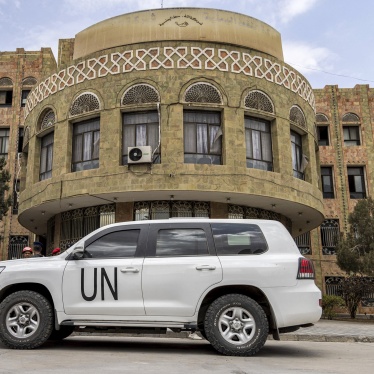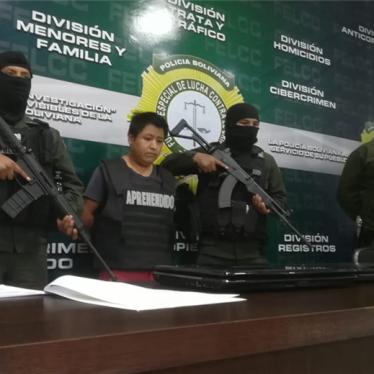(Washington, DC) The government of Argentina should ensure that the agreement it signed with Iran to create a truth commission to investigate the 1994 deadly attack against a Jewish community center in Buenos Aires does not prevent progress in national criminal investigations, Human Rights Watch said today, on the 19th anniversary of the bombing.
Iran refused for years to collaborate with Argentine judicial investigations. But on January 27, 2013, Argentina and Iran signed a “memorandum of understanding” that creates an international commission of jurists with powers to review evidence against Iranians accused by Argentine judicial authorities of being responsible for the bombing, and to interrogate some of the suspects.
The Delegation of Israeli Argentine Associations (DAIA), which groups 120 Jewish communities from all over the country, including AMIA, together with several family members of victims, have challenged the agreement in court, contending that it interferes with the Argentine judicial investigation.
“The families of the victims have waited almost two decades for some progress in this case,” said Jose Miguel Vivanco, Americas director at Human Rights Watch. “It’s going to be up to the Argentine authorities to press Iran for genuine cooperation and not to be stymied or sidetracked in their efforts to resolve this case.”
On July 18, 1994, a car bomb exploded at the entrance of the Argentine Israeli Mutual Association (AMIA), killing 85 people and injuring 300 others. In 2006 an Argentine federal court issued an international arrest warrant for key Iranianofficials as well as a Hezbollah security chief for the crime. All of them are outside of Argentine jurisdiction, and no one has been arrested.
The 2006 warrant was for the arrest of the former Iranian President Ali Akbar Hashemi-Rafsanjani and seven Iranian officials, including the intelligence and foreign ministers, commanders of the elite Revolutionary Guards military units, and diplomats working at the Iranian embassy in Buenos Aires at the time. It accuses them of planning, directing, and otherwise participating in the bombing. The court also issued an arrest warrant for a security chief of Hezbollah, who was assassinated in a car bomb attack in 2008.
Interpol has issued "red notice" alerts for six of these men to determine their location and detain, arrest, or restrict their movement "for the purpose of extradition, surrender, or similar lawful action." Iran has repeatedly denied its involvement in the attack and has refused to extradite the men to Argentina. No extradition treaty exists between Iran and Argentina.
The brief agreement signed by Argentina and Iran does not clearly state the composition and powers of the Truth Commission. It is to consist of five international jurists – each government will designate two, who may not be nationals of their country, and they will jointly appoint the fifth one, who will preside over the commission.
The body, which will eventually establish its own rules of procedure, will review “evidence and information” provided by Iran and Argentina, and issue recommendations on how to “proceed with the case within the framework of laws and regulations of both parties.” The agreement also says that “the commission, Argentine and Iranian judicial authorities will meet in Tehran to proceed to questioning” Iranian suspects who are subject to Interpol red notices.
There is no mention in the text of the relationship between this investigation and the ongoing judicial one in Argentina, but there is an undertaking that "both parties will take into account [the commission's] recommendations in their future actions."
Soon after the agreement was signed, the Argentine foreign minister, Héctor Timerman, told the official news agency that the agreement would allow Argentine judicial authorities to interrogate suspects, which is a critical step to move the judicial investigation forward. However, Iranian media outlets reported that on February 11, Ramin Mehmanparast, Iran’s Foreign Ministry spokesman, rejected any possibility that Argentine judicial authorities could interrogate Iranian suspects.
Given the vague terms of the agreement, and the limited information available regarding its future implementation, it is unclear whether the oral statements given by suspects in Iran would be admitted as evidence before Argentine courts, Human Rights Watch said. The Argentine Criminal Procedures Code requires that a suspect's declaration be given solely before the judge, the prosecutor, and the defendant. The agreement only enables judicial authorities to interrogate the five Iranian suspects with Interpol red notices, and not the three other Iranians the Argentine judge accused of participating in the attack.
The agreement provides that both foreign ministries will send a copy of it to Interpol after its signature. On March 17, the Iranian foreign minister, Ali Akbar Salehi, told the media that, based on the agreement, Interpol should lift the red notices.
While some organizations representing family members of victims have supported the agreement, several others oppose it, the Jewish News Agency reported. On April 4, AMIA and DAIA filed a constitutional challenge to the memorandum on the basis that it undermines judicial independence by granting an international commission the ability to oversee an ongoing judicial investigation. The case is pending before an Argentine federal court.
The pro-government majority in the Argentine Congress ratified the agreement on February 28.
The agreement was signed by Iran's foreign minister and ratified by the Council of Ministers, an executive body of cabinet members and high-ranking officials. There is some debate among lawmakers, though, about whether the agreement also requires ratification by Iran's parliament before it can be implemented.
“The commission could be a significant contribution if independent experts are appointed to it, they adopt internal rules of procedures that respect basic rights and it enables the criminal investigations in Argentina to move forward,” Vivanco said. “However, due to the ambiguity of the agreement's terms and Iran's poor record collaborating with Argentine investigations, there are well-founded concerns that this commission’s findings will not contribute to bringing those responsible for the attack to justice.”








